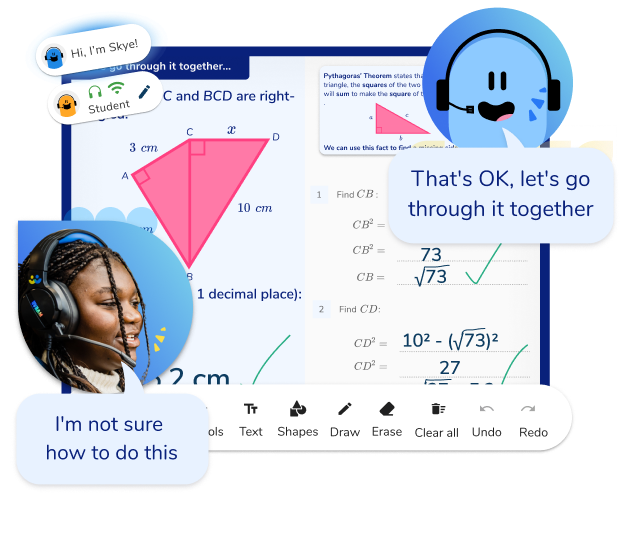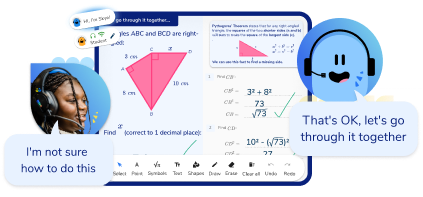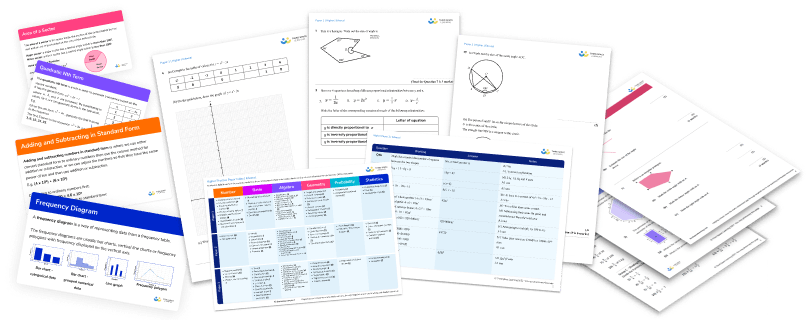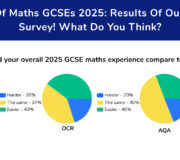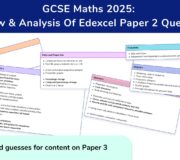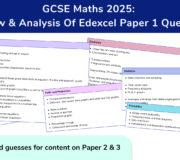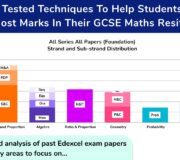GCSE Results 2024: Headlines, Analysis & Next Steps For Teachers & School Leaders
This article was originally published on 23rd August 2024.
GCSE results 2024 have been released! Our resident secondary expert, Christine Norledge, guided us through this year’s busy exam series and is back to navigate GCSE results. In this blog, she’ll finish the series with a thorough analysis of this year’s GCSE results 2024 and key findings to help prepare for next year.
Young people across England received their GCSE exam results on Thursday 22nd August 2024. It seems that there weren’t any massive shocks on GCSE results day, with headline results broadly similar to those in 2023.
TOP TIP
Unless otherwise stated, figures in this article are for 16-year-olds in England. Data from Wales, Scotland and Northern Ireland is excluded.
This blog looks at some of the stories from GCSE results day on Thursday 22nd August 2024. We’ll consider:
- How grade boundaries were set this year;
- What this means for future examination series;
- How students’ and teachers’ experiences of the Edexcel GCSE maths papers were reflected in the results;
- How you can use your maths results to plan for the upcoming year.
GCSE Revision Lists Foundation & Higher
Download these revision lists to support your students and their revision. Includes dedicated Foundation and Higher lists, with links to our collection of free downloadable resources!
Download Free Now!The headlines: similar results to 2023 but higher than 2019
Last year, grades fell as Ofqual implemented measures to re-balance results after the Covid and teacher-assessed grading.
Results in 2023 were lower than those in 2022 but remained slightly higher than 2019 (the last set of summer GCSE exams before Covid).
This year’s headline results are extremely close to those achieved by students in 2023. Fluctuations on the grade 1+, 4+ and 7+ borderlines are extremely small.
Overall, the pass rate is up by 0.1 percentage points for 16-year-olds in England, but down slightly by 0.4 percentage points when we consider all ages in England, including those resitting and private entries.
SPOTLIGHT
For 16-year-olds in England, 70.4% of GCSEs across all subjects were awarded the ‘standard pass’ mark of grade 4 or above. For all ages sitting GCSEs, a pass mark of 4 or above was awarded to 67.4% of GCSEs.
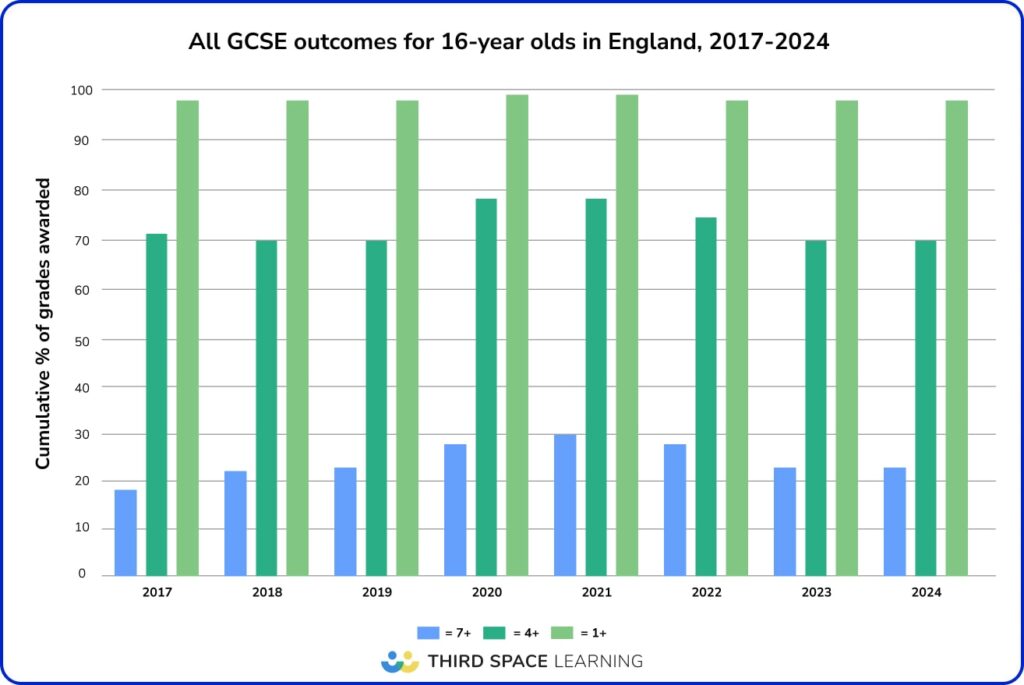
The following headline information applies to all GCSEs in all subjects for 16-year-olds in England.
GCSE students achieving a grade 1 or above:
- The proportion of grade 1+ awarded has very slightly risen by 0.1 percentage points to 98.2%;
- Last year’s result of 98.1% was the lowest in the history of the specification; grade 1+ passes remain low this year.
GCSE students achieving a ‘pass’ grade of 4 or above:
- The proportion of grade 4+ awarded has risen by 0.1 percentage points to 70.4%;
- This is in line with last year’s result of 70.3% and remains slightly higher than 2019’s 69.9%.
GCSE students achieving the top GCSE grades (grade 7 or above):
- The proportion of GCSEs awarded grade 7+ has increased slightly by 0.2 percentage points to 22.6%;
- This is in line with last year’s result of 22.4% and remains slightly higher than 2019’s 21.8%.
GCSE maths outcomes: headline figures
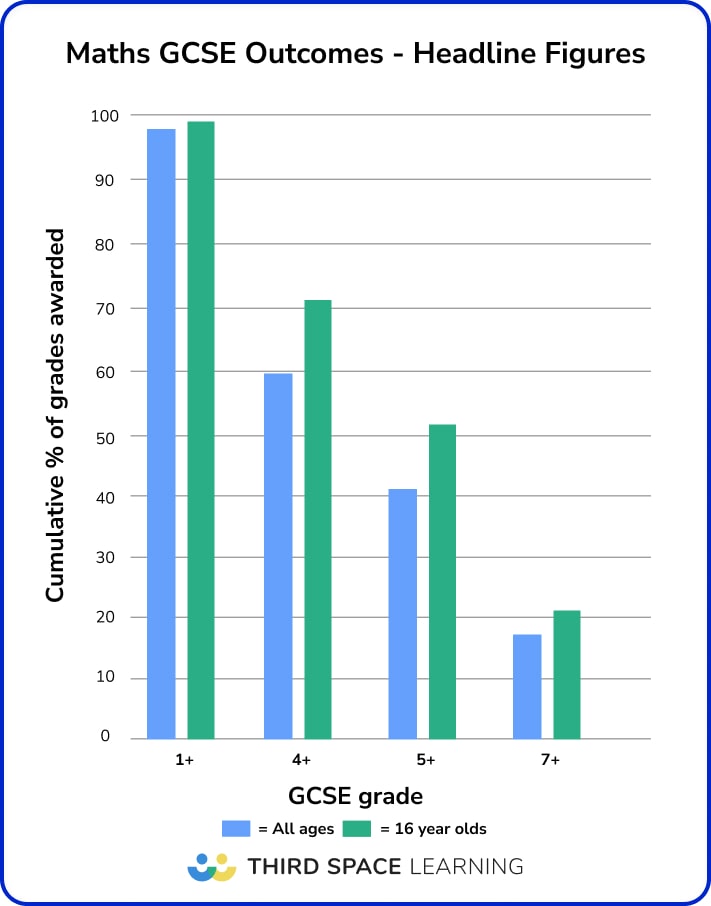

For 16-year-olds in England in 2024:
- The proportion of grade 1+ awarded in maths dropped by 0.1 percentage points from 2023.
- The proportion of grade 4+ ‘standard pass’ awarded in maths dropped by 0.3 percentage points; this is still higher than the 2019 figure of 71.5%.
- The proportion of grade 5+ ‘strong pass’ GCSE awards rose by 0.9 percent from 2023.
The proportion of 7+ ‘top grades’ (7+) in maths rose by 0.1 percentage points; this remains slightly higher than the 2019 figure of 20.4%.
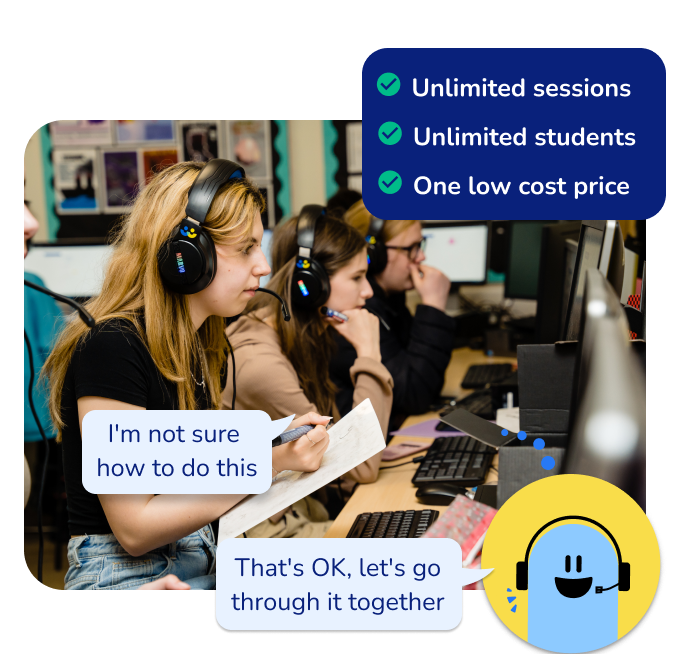
Unlimited GCSE maths tutoring with Skye, the voice-based AI maths tutor.
Built on the same principles, pedagogy and curriculum as our traditional tutoring but with more flexibility, reach and lower cost.
Help your GCSE students achieve their target grade with Skye’s one to one maths tutoring.
Watch Skye in actionBigger picture: headline results for other GCSE subjects
At Third Space Learning, we’re maths specialists, so this article focuses primarily on the 2024 maths GCSE exams and results.
But here are a few highlights from other subjects:
English language and literature
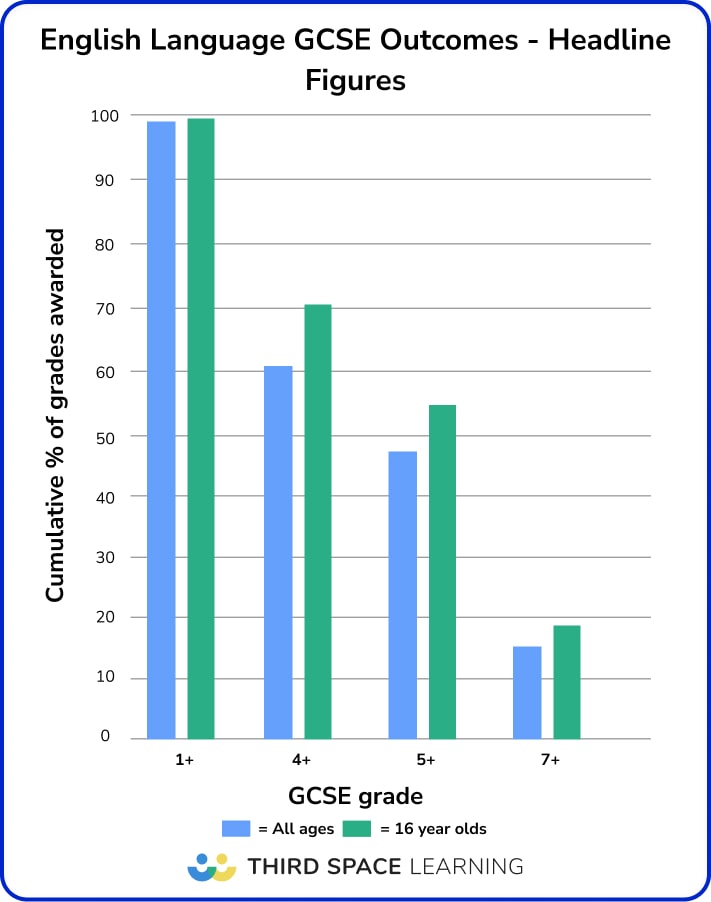

Similarly to maths, the percentages of candidates achieving the benchmark grades in English language did not change significantly in 2024.
Grade drops in English literature have also been relatively minor.

As results are very similar to 2023, maths and English language remain generally higher than in 2019.
Larger drops in English literature mean results are up to half a percentage point lower than 2019.
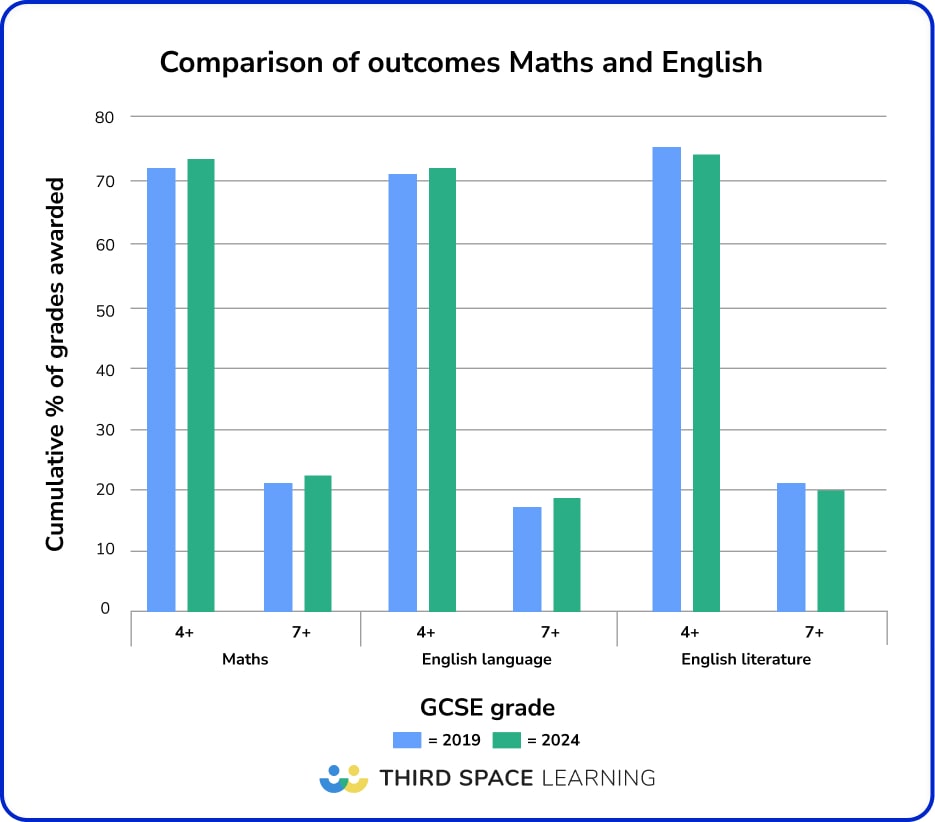

Modern foreign languages
This year, similar adjustments were made in French at grades 4 and 7, and in German at grades 4, 7 and 9 we saw in 2023 to better align outcomes with Spanish.
Grades in all three MFL subjects fell sharply in 2023 but have risen this year, particularly at the grade 7+ benchmark in French and German.

Science
Double Award Science results fell in 2023 to numbers much closer to 2019’s pre-pandemic result. This year’s results are slightly up for both 4+ and 7+ grades.

Maths GCSE results 2024: adjustments and grade boundaries
GCSE grading looks like it’s back to normal following the gradual process of removing exam adaptations and grading allowances. This year, the only concession was access to a maths formula sheet, which will be removed for the 2025 exam season.
In 2022, GCSE grade boundaries reflected a ‘midpoint’ between the last pre-pandemic exams in June 2019 and teacher assessments from summer 2021.
This adjustment was removed in 2023. Grade boundaries were set as normal but with an element of ‘protection’ built in for the cohort to reflect disruptions to learning. This was a similar methodology to what was applied for the first cohorts of students sitting reformed GCSEs and A-levels in 2017.
This year, grading continued as normal and the standards were maintained from summer 2023. Unsurprisingly, results are very similar to June 2023.
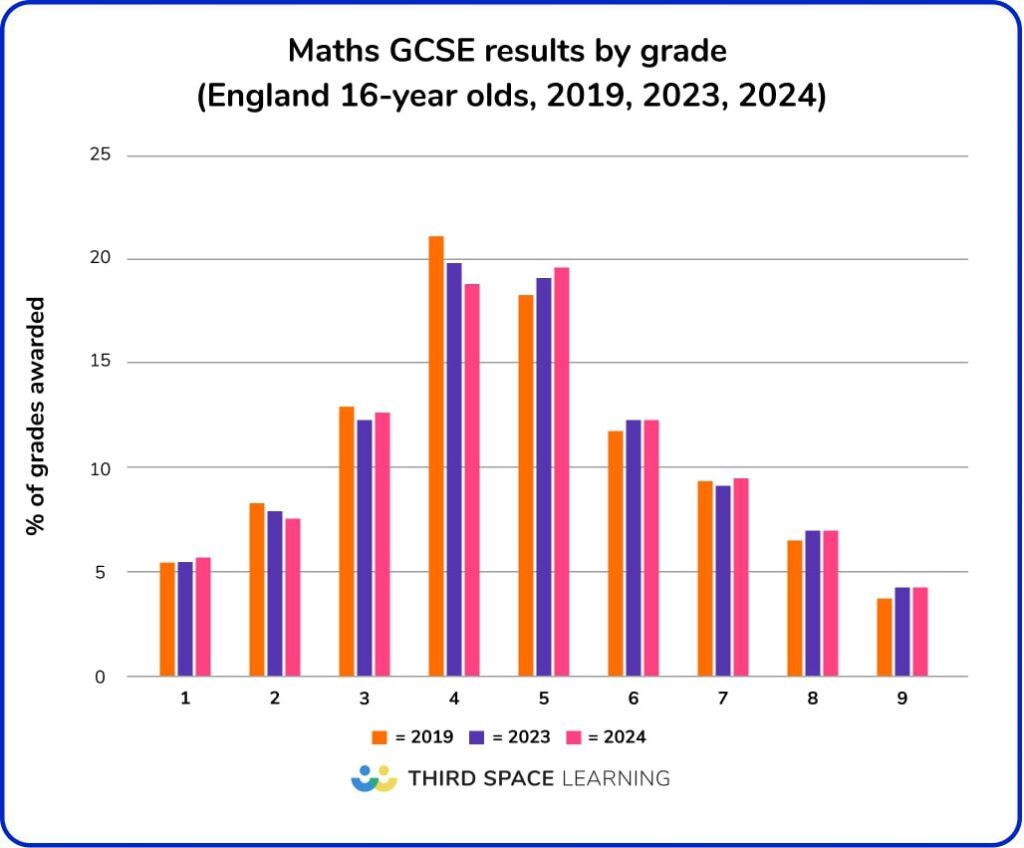
Summer 2022 saw a higher proportion of higher grades (9-5) and a lower proportion of lower grades (4-1) awarded compared to summer 2019. This was reversed in 2023 but results remained higher than 2019.
While broadly similar, 2024 saw minor fluctuations from 2023 around the “non-benchmark” grades. For example, grade 2 awards are down slightly, and grade 3 awards are higher.
Grades 4 and 5 had more significant fluctuation this year, with the number of grade 4 awards down and the number of grade 5 awards up.
Although the total number of candidates achieving grade 4+ dropped this year, results for grade 5+ are up by almost one percentage point. This could indicate that more candidates have pushed over that crucial 4/5 borderline boundary this year.
Edexcel GCSE maths results 2024
Throughout the 2024 exam season, I analysed each exam, with particular emphasis on Edexcel Foundation and Higher exam papers.
My main highlights were as follows:
- Both tiers had a mixed reception; students found Papers 1 and 3 particularly challenging, but had an easier time with Paper 2;
- Foundation tier had a higher proportion of procedural questions and a lower proportion of multi-step unfamiliar problems compared to the “average” paper;
- Higher paper was much closer to average distributions.
Edexcel Higher grade boundaries 2017-2024
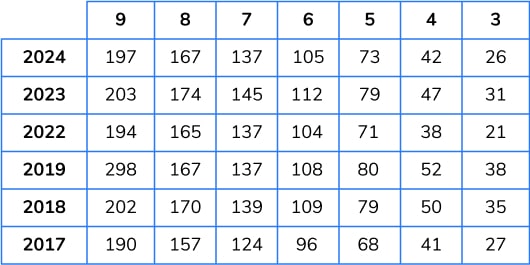
- Boundaries for this year are, on average, six marks lower than 2023’s exams;
- Boundaries at grade 5+ are close to the average for all previous summer series;
- Grade 3 and 4 boundaries are slightly lower than the average of all previous summer series.
Edexcel 2024 Higher grade boundaries by paper

- Boundaries were generally similar across the three Higher papers;
- Paper 3 had slightly higher grade boundaries at grade 5+, indicating that stronger mathematicians could have found this paper slightly easier.
Edexcel Foundation grade boundaries 2017-2024
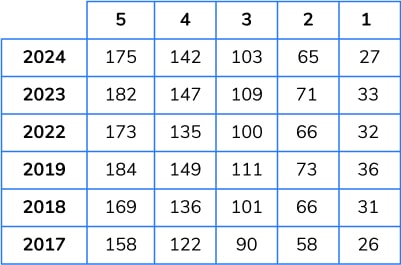
- Boundaries for this year’s Foundation paper are also, on average, six marks lower than 2023’s exams;
- Boundaries for grades 4 and 5 are marginally lower than the average for the previous summer papers;
- Grade 1 boundary is considerably lower than average.
Edexcel 2024 Foundation grade boundaries by paper
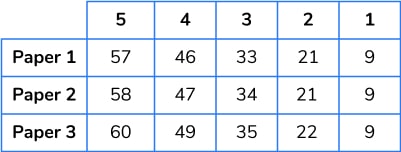
- Boundaries were very similar across all three papers, with very little variation across grades;
- Paper 1 had the lowest boundaries and Paper 3 the highest, which seems to contradict students’ perceptions that Papers 1 and 3 were both difficult!
- Boundaries are relatively similar to previous years.
How to use the GCSE results 2024 data
Once we’ve wrapped up this year’s exam season—congratulating successes, offering support where needed, and applying for re-marks as necessary—September is an ideal time to reflect on key lessons that can be applied to the next round of exams.
- Focus on both high and low-performing students. Were there any surprises?
- Investigate the reasons behind any underperformance. Were these students identified and supported earlier in the year?
- Evaluate the effectiveness of any interventions your school or department provided.
- Use question-level analysis to identify class-wide patterns.
- If borderline scripts are sent off for review of marking, take the time to analyse them when they are returned, even if the marks remain unchanged.
- Some GCSE exam boards allow you to view scripts electronically (with student permission), which is worth exploring.
- Use the analysis tools provided by your exam board. For example, compare your results to the board average to identify your students’ relative strengths and weaknesses.
When examining class-wide trends, consider the following:
- Are there any GCSE maths topics that your entire class or school struggled with?
- Were these topics anticipated? For example, students aiming for a grade 4 struggled with the large amount of graph work on this year’s papers.
- If unexpected topics showed poor performance (e.g. all students consistently struggled with procedural standard form questions), this might highlight areas for improvement in teaching and learning next year.
- Identify the types of questions students are finding difficult. Can this be addressed in the upcoming year?
FREE PRACTICE PAPERS
Support class-wide GCSE maths preparation with Third Space Learning’s FREE practice paper packs.
Each set contains three GCSE maths papers: Paper 1 (non-calculator), Paper 2 (calculator) & Paper 3 (calculator). Each set matches the specifications of the three most popular GCSE exam boards: Edexcel, AQA and OCR.
Save time by downloading a selection of specially produced practice papers, mark schemes and exam question indexes.
When are GCSE 2024 resits?
Students who did not achieve their desired results have the opportunity to retake their GCSE exams. Resits for GCSE English and maths will be held in November 2024.
The key dates for the 2024 maths resits are:
- Paper 1 – Wednesday 6th November (AM)
- Paper 2 – Friday 8th November (AM)
- Paper 3 – Monday 11th November (AM)
Resits for other exams will be during the 2024 exam season.
These resits usually take place alongside further education at sixth form colleges or during apprenticeships.
CONSIDERING INTERVENTIONS FOR NEXT YEAR?
With the support of a dedicated GCSE maths tutor, struggling students are more likely to achieve their target grades in maths.
Third Space Learning’s one-to-one GCSE maths tuition programme is designed specifically for GCSE students in secondary schools and academies who are struggling with maths or lacking in confidence.
Tutors tailor every maths lesson to a student’s learning gaps and needs, focusing on their specific areas for improvement. Our programme includes practice papers, past papers, and targeted exam preparation to ensure students are ready for their GCSE maths exam.
Tutoring makes them feel like we care about them, more than the impact on progress that it provides. They like feeling and being treated differently to Y10 and the additional voices in the school that say the same thing add to the whole school impact.
Assistant Head
Westminster Academy
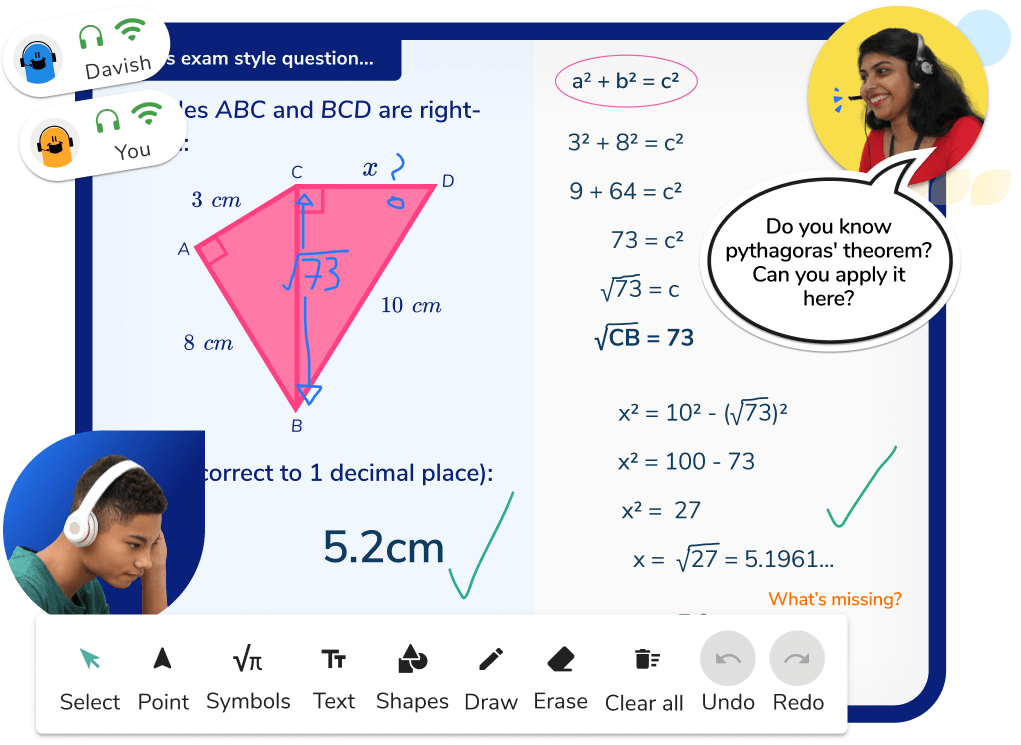
Further reading:
Interactive graphs and statistics for this year’s GCSE results.
Results for this year’s GCSE examinations.
The grade boundaries per paper for Edexcel exams in 2024.
A look at how grade boundaries are set for GCSEs from Third Space Learning.
DO YOU HAVE STUDENTS WHO NEED MORE SUPPORT IN MATHS?
Skye – our AI maths tutor built by teachers – gives students personalised one-to-one lessons that address learning gaps and build confidence.
Since 2013 we’ve taught over 2 million hours of maths lessons to more than 170,000 students to help them become fluent, able mathematicians.
Explore our AI maths tutoring or find out how a GCSE maths tutor could support students in your school.
